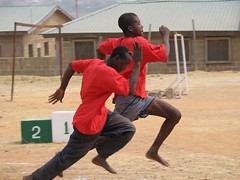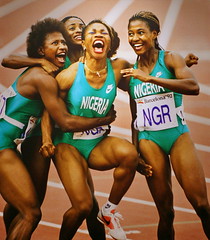| Malawian born Mkandawire leaving the pitch after victory for Millwall over Scunthorpe in the English league. Mkandawire cannot play football for Malawi because Dual Citizenship is not recognized.(Photo credit: Wikipedia) |
Many professional football (soccer) players today are citizens of more than one country. Most professional clubs have at least one player or coach who holds multiple nationalities. This reflects the current world we live in where borders can be transcended and people are a hodge-podge of identities. At FIFA World Cup 2010, we observed Ghanian born brothers compete at the international level on different teams. Jerome Baoteng played for Germany, whilst his brother Kevin-Prince Boateng played for Italy. This is testament of how nationality laws affect football player’s career and a country's chances of winning international competitions. Dual Citizenship can provide advantages for both Malawi and Malawian Footballers to allow them to become more competitive.
Having Dual Citizenship has historically helped African players in their football careers. It gives them career options. At the domestic level, players often become naturalized citizens in foreign countries in order to play for a league. Once these players become naturalized citizens, they can no longer play for Malawi because Malawi doesn’t recognize Dual Citizenship. They no longer have a choice regarding whom to play for. Under current Malawi law, they automatically lose their citizenship. The foreign clubs encourage naturalization because they benefit from having naturalized players. As an example, African football players can join an EU team without their presence counting against their domestic league’s quota of foreigners. They also get to retain our most talented players for their domestic leagues.
At the international level, players also become naturalized to benefit of their careers and their new country. Since Malawi does not recognize Dual Citizenship, this means that Malawians naturalized abroad, cannot represent Malawi at senior level non-friendlies. This is a disadvantage to Malawi. Such laws automatically disqualified Malawian-born players such as Tamika Mkandawire (an English league Midfielder) from representing Malawi during any stage of his career. If Dual Citizenship was an option for him and many other Malawians, he would be free to make that decision for themselves per FIFA guidelines. According to FIFA, dual nationality players may only represent one country if they are playing at the senior competitive level. This means players with Dual Nationality have the option of choosing who they will represent with as professional player. Players as senior level can play friendlies for any country. However, the rules are stricter at the senior level.
In accordance with current global citizenship trends FIFA should consider redressing these regulations so that they are similar to the rules for the junior level players. At the junior level, players with dual nationality are now allowed to switch who they represent. They have to submit an application to FIFA in order to change who they play for. Prior to 2004, FIFA rules forbade this even if the player had played international football only at junior level. Recently, we have seen Ricardo Nunes who was born in South Africa and raised in Portugal, exercise this right. He is a former Portuguese under-17 but has also played for Bafana Bafana. Midfielder Emmanuel Frimpong submitted an application in order to play for Ghana at the 2013 Africa Cup of Nations. He is a British citizen but has a strong emotional connection to Ghana. Players like Frimpong are an example of Africans in the Diaspora that have a sense of dual identity and dual loyalty. He is proudly British, but also proudly Ghanaian.
In the new global world we are seeing more African players move of in both directions – movement is both to and from of the continent. In the past, we saw greater movement from people moving out of the continent and in to non-African leagues. France was an epitome of a country that benefited from Dual Citizenship. Many of the players in their national team were (and still are) famously African born. France is now seeing a new trend where African players with Dual Citizenship at the youth level are being trained in France, but are opting to play for the country of their parents (or their own) birth. This includes junior league players such as Arouane Chamakh, Sébastien Bassong, Younès Belhanda, Benoît and Assou-Ekotto. Players that are naturalized outside of Africa or have African born parents are also making different choices about who they want to play for. Their rationale is in part due to their sense of belonging to Africa, and in part, as a career decision.
Dual Citizenship for football players is also about giving people options that are mutually beneficial. It would give the players more exposure or a sense of national pride. For countries which have limited resources like Malawi, It would mean foreign trained players will be given an option to play for Malawi without Malawi struggling to find resources. The success of Malawian citizen players would also bring recognition and money in to Malawian football through sponsorship and prize money. Although some people express concern that Dual Citizenship would come at the expense of the local team, this is largely speculation. Granting Dual Citizenship does not always mean that there will be an automatic influx of Dual Citizens dominating the local leagues in African nations. As an example South African born Andrew Surman, an English Norwich City under-21, indicated that he was not interested in playing for South Africa even though he is a dual national because of various considerations. Footballers often have many other decisions to weigh in before deciding to uproot their lives to play and live abroad. Former Malawian captain John Maduka considered his family before obtaining South African citizenship. He wanted his children to continue school and run personal businesses. He played professional football for a South African premier league team Umtata Bush Bucks before applying for citizenship there. Although he considered it necessary to obtain South African citizenship for practical reasons, he still wanted to retain ties with Malawi. He was confined by citizenship laws and had to navigate football regulations.
FIFA regulations for the junior team changed a few years ago to reflect the current trends. There are renewed calls for FIFA to have these rules apply to the senior level players as well. There is a chance that FIFA will revisit these regulations in the near future since the world continues to become more global. Malawi should be able to revisit its laws so that they reflect the current times as well. We need to be able to adapt to the realities in a new world of complex multiple identities and multiple nationalities. Dual Citizenship will give our football players and Malawi an added advantage. Malawi’s laws should provide advantage so that we can remain competitive.





